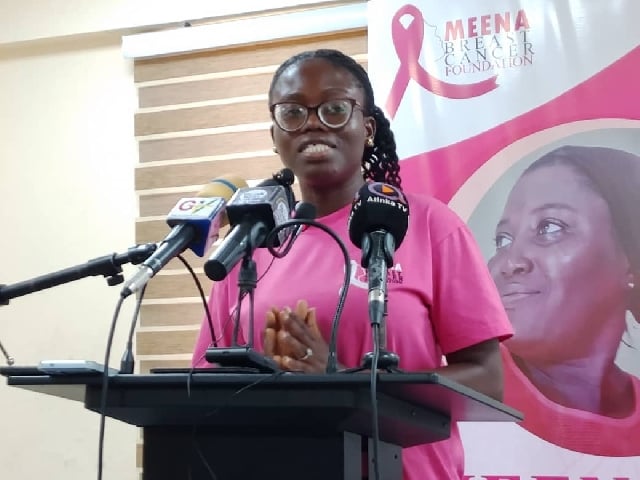The Meena Breast Cancer Foundation has placed a strong emphasis on the importance of self-examination for girls and women to combat breast cancer effectively. During a recent event at the Ghana International Press Centre in Accra on October 23, 2024, the foundation, led by Madam Meena Ahema Duodu, commemorated Breast Cancer Awareness Month with a clear message: “Early detection saves lives.” Madam Ahema Duodu highlighted a worrying trend whereby breast cancer is increasingly being diagnosed in younger individuals, including girls as young as 15. She expressed concern that breast cancer used to predominantly affect older adults but now presents a significant risk to young women, stressing the urgent need for awareness and proactive measures.
Madam Ahema Duodu advised that there is no specific age group that can be considered safe from breast cancer, underscoring the necessity for early self-examination. She urged that every girl should begin self-examination once they start menstruating, which is a critical phase in a female’s health journey. The recommendation is to perform self-examinations on a monthly basis, specifically five days after menstruation, to enhance the chances of early detection. The foundation believes that such measures are vital for saving lives, as breast cancer caught at an early stage can lead to far better outcomes.
The statistics she shared were alarming, revealing that more than 4,000 women are diagnosed with breast cancer annually in Ghana. Tragically, over half of those diagnosed succumb to the disease due to a lack of early detection and intervention. This grim reality underscores the necessity for greater awareness and education about breast cancer and the vital role self-examination can play in detecting potential signs early. Madam Ahema Duodu’s remarks call attention to the broader implications of breast cancer not just on individual health but on Ghana’s human resources as well, with many potentially capable individuals being lost to this disease.
Moreover, the foundation contends that addressing breast cancer should not be the sole responsibility of women; it requires a collective effort from individuals, organizations, and the government. There is a clear call for comprehensive national strategies that aim not only to raise awareness but also to provide resources for education and screening programs. Madam Ahema Duodu reiterated that her foundation is committed to offering educational opportunities and facilitating screening exercises throughout the year, which can significantly enhance early detection rates.
Education remains a cornerstone of the foundation’s mission. They are dedicated to empowering females with the knowledge and skills necessary to perform effective self-examinations. In addition, the foundation emphasizes that women should be vigilant and proactive about their breast health. This initiative not only serves to improve personal health outcomes but also fosters a community of informed individuals capable of making better health decisions—thereby reducing the stigma around breast cancer and promoting open discussions about health issues affecting women.
In conclusion, the Meena Breast Cancer Foundation’s campaign showcases the urgent need for awareness, education, and proactive measures regarding breast cancer, especially among young women in Ghana. As breast cancer increasingly affects younger demographics, the call for self-examination becomes even more critical. The foundation advocates for a societal approach to mitigate the disease’s impact, encouraging collaboration among various stakeholders to provide the necessary resources and education. With awareness and early detection as guiding principles, there is hope for reducing the mortality rates associated with breast cancer in Ghana and fostering healthier communities.














